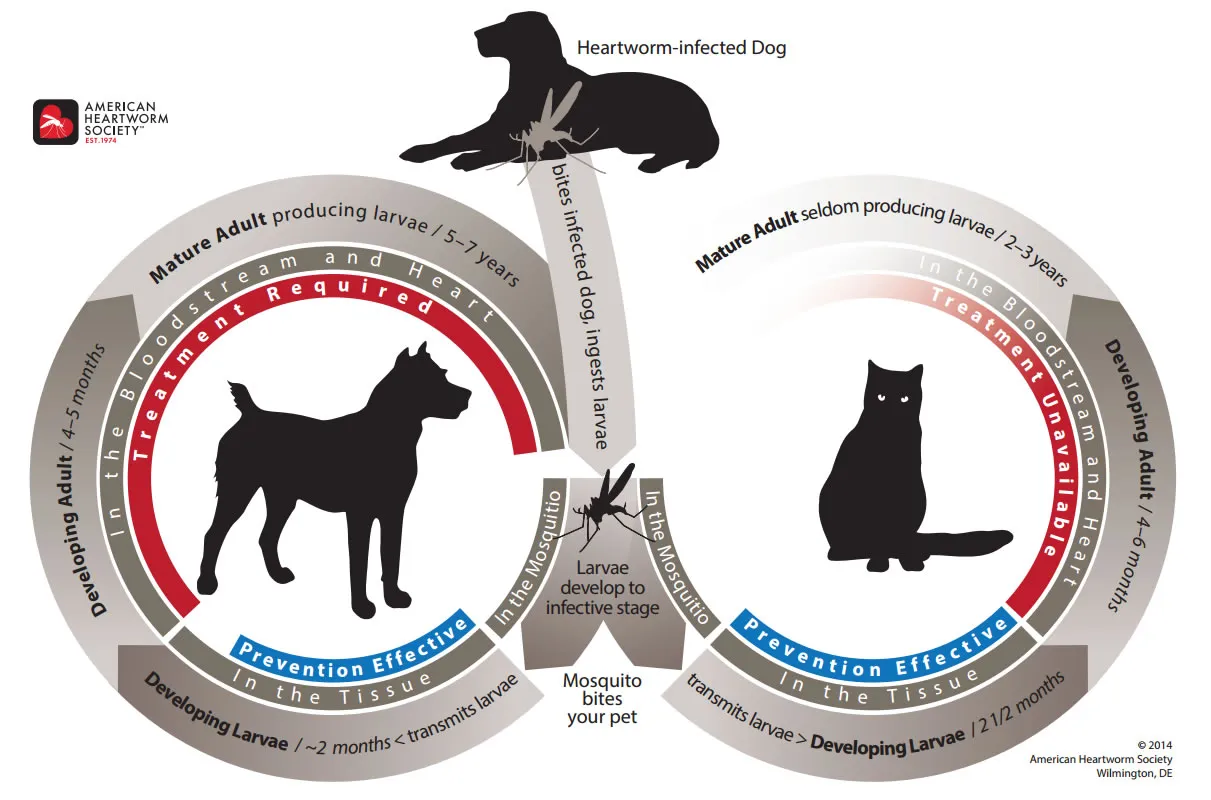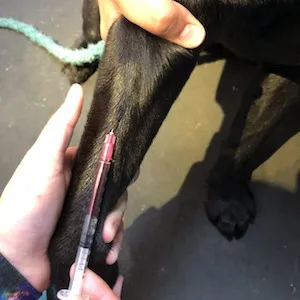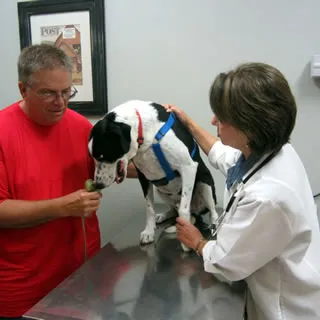Heartworm disease in dogs is a serious and potentially life-threatening condition caused by parasitic worms that reside in the heart, lungs, and blood vessels. Transmitted primarily through mosquito bites, this disease affects dogs most severely as their natural hosts, leading to heart failure, lung damage, and other organ complications if left untreated. While cats and ferrets can also be impacted, dogs face the highest risk and numbers of infection. According to the American Heartworm Society (AHS), prevention is the most effective strategy, as early detection and treatment can save lives but often come with challenges. If you’re a dog owner, understanding heartworm prevention for dogs alongside routine care is essential, especially in mosquito-prone areas.
This comprehensive guide covers everything from transmission and symptoms to testing, treatment, and FAQs, drawing on expert recommendations from veterinary authorities like the AHS to help pet owners protect their furry companions.
What Is Heartworm Disease?
Heartworm disease strikes dogs, cats, ferrets, and even wildlife like foxes and coyotes, but dogs serve as the primary natural host. These foot-long parasites, known scientifically as Dirofilaria immitis, mature inside the host, reproduce, and multiply rapidly if not addressed. In dogs, untreated infections can lead to hundreds of worms, causing irreversible damage to the pulmonary arteries, heart, and lungs—even after worms are eliminated.
 Heartworms visible in a dog's heart and lungs
Heartworms visible in a dog's heart and lungs
Cats experience a different scenario as atypical hosts; few worms reach adulthood, often just 1-3, yet immature stages trigger heartworm-associated respiratory disease (HARD), mimicking asthma. Ferrets, with their tiny hearts, suffer dramatically from even a single worm. Prevention remains key across species, as treatments vary in availability and efficacy.
How Is Heartworm Transmitted?
Mosquitoes are the vectors in the heartworm life cycle. Infected animals release microfilariae (baby worms) into their bloodstream. A feeding mosquito ingests these, allowing larvae to develop over 10-14 days into infective stages. When it bites another pet, larvae enter via the wound, maturing into adults in about six months. Adults can survive 5-7 years in dogs and 2-3 years in cats, perpetuating infections across mosquito seasons.
 Detailed life cycle of heartworms showing mosquito transmission stages
Detailed life cycle of heartworms showing mosquito transmission stages
Wind-blown mosquitoes and relocating infected pets exacerbate spread, as seen post-Hurricane Katrina. Both indoor and outdoor dogs are vulnerable.
Signs of Heartworm Disease in Dogs
Early heartworm disease in dogs often shows no symptoms, delaying diagnosis. As it advances, watch for persistent cough, exercise intolerance, fatigue, reduced appetite, and weight loss. Severe cases involve heart failure with abdominal swelling, labored breathing, pale gums, and dark urine from caval syndrome—a blockage requiring emergency surgery.
Active or heavily infected dogs exhibit signs sooner. Long-term, vascular scarring persists, impacting quality of life.
Signs in Cats and Ferrets
In cats, symptoms range from subtle (coughing, vomiting, anorexia) to severe (seizures, collapse, sudden death). Even one worm causes significant distress via HARD.
 Veterinarian examining a cat for heartworm symptoms
Veterinarian examining a cat for heartworm symptoms
Ferrets mirror dogs but progress faster: lethargy, rapid breathing, pale gums, coughing. A single worm overwhelms their small hearts. For related skin issues sometimes confused with parasites, check home remedies for dog mites on skin.
Assessing Your Pet’s Risk
Heartworms occur in all 50 U.S. states, with hotspots near coasts and rivers. Climate, wildlife reservoirs, and mosquito populations drive variability—even northern or desert areas aren’t immune. Strays, coyotes, and travel amplify risks.
 2019 AHS incidence map showing heartworm prevalence across the U.S.
2019 AHS incidence map showing heartworm prevalence across the U.S.
AHS advises “think 12”: test every 12 months and prevent year-round. Indoor pets need protection too.
Heartworm Testing Protocols
Early testing via blood antigen detection is crucial, as symptoms lag. Vets process samples in-clinic or via labs.
 Veterinarian drawing blood from a dog for heartworm testing
Veterinarian drawing blood from a dog for heartworm testing
Dogs: Puppies under 7 months start prevention sans test; test at 6-7 months, then annually. Adults test before starting meds.
Cats/Ferrets: Combine antigen/antibody tests, imaging. Retest periodically.
Even on preventives, annual tests confirm efficacy—missed doses happen.
Treatment for Positive Dogs
Most dogs recover with prompt care. Steps include:
- Confirm diagnosis.
- Strict exercise restriction.
- Stabilize health.
- Melarsomine injections (AHS protocol: three doses).
- Post-treatment testing at 9 months.
 Dog resting in a cage during heartworm treatment recovery
Dog resting in a cage during heartworm treatment recovery
Complications rise with severity, but success is high. Start preventives pre-treatment to halt new infections. Wondering about contagion? See my dog has giardia can i get it for parasite transmission insights.
Managing Heartworm in Cats and Ferrets
No FDA-approved treatments exist for cats or ferrets—focus on stabilization, anti-inflammatories, and monitoring. Surgery is rare.
 Cat in recovery cage post-heartworm diagnosis
Cat in recovery cage post-heartworm diagnosis
Spontaneous clearance occurs in cats, but damage lingers. Ferrets face rapid decline; even one worm is dire.
 Ferret showing signs of heartworm distress
Ferret showing signs of heartworm distress
Prevention is vital. For ear issues linked to parasites, explore at home remedies for dog ear mites.
Prevention Strategies
Monthly FDA-approved preventives (oral, topical, injectable) kill larval stages. Start puppies/kittens at 8 weeks, ferrets at 2 lbs. Many cover intestinal worms, fleas, ticks too—consult vets.
Prescriptions require testing. Year-round use, even in low-risk areas, is recommended. Missed doses? Restart and retest in 6 months.
 Veterinarian conducting a pet exam for heartworm prevention
Veterinarian conducting a pet exam for heartworm prevention
No vaccines or unproven naturals suffice.
Common FAQs on Heartworm Disease
Prescription needed? Yes, post-testing.
Multi-parasite protection? Yes, including hookworms; see can a dog get human head lice for cross-species info.
Young pets? Start early, weigh regularly.
Regional risks? Nationwide; year-round prevention.
 Dog with veterinarian discussing heartworm prevention
Dog with veterinarian discussing heartworm prevention
Post-treatment positive? Retest; worms die gradually.
Conclusion
Heartworm disease in dogs demands vigilance—prevention trumps treatment for lasting health. Test annually, prevent consistently, and consult your vet for tailored plans. Early action protects your pet’s heart and lungs for years. Explore more parasite tips like home remedies to get rid of ear mites in dogs and share your experiences below!
References
- American Heartworm Society (AHS): heartwormsociety.org
- FDA Guidelines on Heartworm Preventives
- AHS Incidence Maps (2019 data, updated annually)
